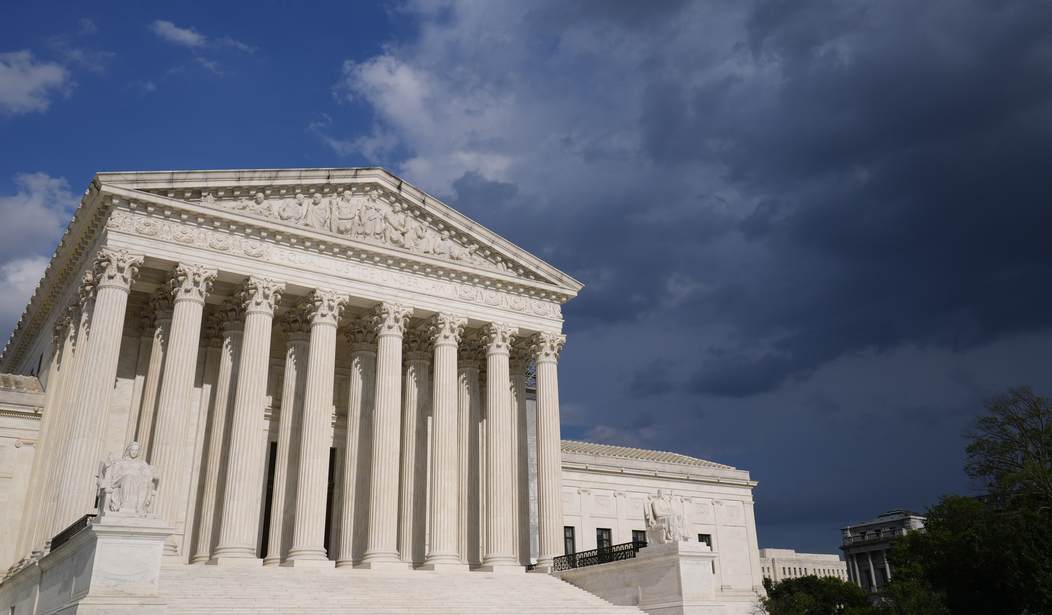You know, I was pretty well on top of things in terms of keeping up with Supreme Court decisions and these Skinny on SCOTUS installments, and then all heck broke loose, and my attention has, of necessity, largely been focused on non-court goings on. But we've had two decision days since my last installment — each with six opinions — and Wednesday is set to be another decision day, so if I don't get to this now, they're just going to keep piling up.
The June 5th decisions were primarily unanimous, although Judge Kavanaugh dissented on the "DIG" (dismissed as improvidently granted). The decisions were authored by Thomas, Alito, Sotomayor, Kagan, and Jackson, and — surprisingly enough — all three of the liberal justices' decisions are ones with which conservatives largely agree.
June 5, 2025 Decisions
Date: June 5, 2025
Author: Thomas
Split: 9-0
Dissent: N/A
Appeal From: 2nd Circuit
Plaintiffs, who are victims and families of victims of terrorist attacks carried out by Hamas between 2001 and 2003, sued BLOM Bank SAL under the Anti-Terrorism Act for allegedly aiding and abetting the attacks by providing financial services to Hamas-affiliated customers. BLOM argued that the complaint failed to state a claim, and plaintiffs repeatedly affirmed they would not seek to amend their complaint if it were dismissed. The District Court dismissed the complaint with prejudice, finding that plaintiffs had not adequately alleged that BLOM had the requisite general awareness for aiding-and-abetting liability. The court denied leave to amend because plaintiffs had declined several opportunities to amend and failed to identify additional facts they could allege. The Second Circuit affirmed the dismissal, finding that even though the District Court had applied too stringent a standard for the general awareness element, plaintiffs’ claims still failed under the correct standard. Following the affirmance, plaintiffs returned to the District Court and moved under Federal Rule of Civil Procedure 60(b)(6) to vacate the final judgment so that they could file an amended complaint to meet the Second Circuit’s clarified standard. The District Court denied the motion, ruling that the Second Circuit’s clarification did not constitute the “extraordinary circumstances” required for Rule 60(b)(6) relief, and that plaintiffs’ prior deliberate choices not to amend counseled against relief. On appeal, the Second Circuit reversed, holding that when a party seeks Rule 60(b) relief to file an amended complaint, district courts must not apply Rule 60(b)(6)’s extraordinary circumstances standard in isolation but must instead balance Rule 60(b)’s finality principles with Rule 15(a)’s liberal amendment policy.
Whether Rule 60(b)(6)'s stringent standard applies to a post-judgment request to vacate for the purpose of filing an amended complaint.
Holding: Reversed and remanded.
Relief under Rule 60(b)(6) requires extraordinary circumstances, and this standard does not become less demanding when the movant seeks to reopen a case to amend a complaint. A party must first satisfy Rule 60(b) before Rule 15(a)’s liberal amendment standard can apply.
Skinny: Plead your case right the first time — or, at least, when the court tells you it will be dismissed if you don't. You only get so many chances.
Side Skinny: Hamas has been the bad guys for decades.
CC/Devas (Mauritius) Ltd. v. Antrix Corp.
Date: June 5, 2025
Author: Alito
Split: 9-0
Dissent: N/A
Appeal From: 9th Circuit
Devas Multimedia Private Ltd. signed a satellite-leasing agreement with Antrix Corporation Ltd., which is owned by the Republic of India for use by its Department of Space. But when the Indian Government later determined it needed more satellite capacity for itself, Antrix terminated the contract under its force majeure clause. The parties proceeded to arbitration. After unanimously concluding that Antrix had breached the contract, the arbitral panel awarded Devas $562.5 million in damages plus interest. Devas then petitioned the United States District Court for the Western District of Washington to confirm the award. The District Court confirmed the award and entered a $1.29 billion judgment against Antrix.
The Ninth Circuit reversed, finding that personal jurisdiction was lacking. Under the Foreign Sovereign Immunities Act of 1976 (FSIA),“[p]ersonal jurisdiction over a foreign state shall exist” whenever (1) an immunity exception applies, and (2) the foreign defendant has been properly served. §1330(b). The Ninth Circuit did not question that Antrix is a “foreign state” under the FSIA, that an immunity exception applies, and that Devas effectuated proper service. Yet bound by Circuit precedent, the panel explained that the Act imposes an additional requirement: “personal jurisdiction under the FSIA [also] requires a traditional minimum contacts analysis” as set forth in International Shoe Co. v. Washington, 326 U. S. 310, and its progeny. Applying that standard, the court concluded it could not exercise personal jurisdiction over Antrix because Antrix lacked sufficient suit-related contacts with the United States.
Whether plaintiffs must prove minimum contacts before federal courts may assert personal jurisdiction over foreign states sued under the Foreign Sovereign Immunities Act.
Holding: Reversed and remanded.
Personal jurisdiction exists under the FSIA when an immunity exception applies and service is proper. The FSIA does not require proof of “minimum contacts” over and above the contacts already required by the Act’s enumerated exceptions to foreign sovereign immunity.
Skinny: The 9th Circuit [and appellate courts in general] need to quit coming up with extra hoops for litigants to jump through. They should read the statute, not read into it.
Catholic Charities Bureau, Inc. v. Wisconsin Labor and Industry Review Comm’n.
Date: June 5, 2025
Author: Sotomayor
Split: 9-0
Dissent: N/A
Appeal From: Wisconsin Supreme Court
Wisconsin law exempts certain religious organizations from paying unemployment compensation taxes. The relevant statute exempts nonprofit organizations “operated primarily for religious purposes” and “operated, supervised, controlled, or principally supported by a church or convention or association of churches.” Wis. Stat. §108.02(15)(h)(2). Petitioners, Catholic Charities Bureau, Inc., and four of its subentities, sought this exemption as organizations controlled by the Roman Catholic Diocese of Superior, Wisconsin. The Wisconsin Supreme Court denied the exemption, holding that petitioners were not “operated primarily for religious purposes” because they neither engaged in proselytization nor limited their charitable services to Catholics.
- Does a state violate the First Amendment's Religion Clauses by denying a religious organization an otherwise-available tax exemption because the organization does not meet the state's criteria for religious behavior?
- In addressing federal constitutional challenges, may state courts require proof of unconstitutionality "beyond a reasonable doubt?"
Holding: Reversed and remanded.
The Wisconsin Supreme Court’s application of §108.02(15)(h)(2) to petitioners violates the First Amendment.
Skinny: It's not up to the Wisconsin Supreme Court to determine whether a particular denomination meets its standards. A religious exemption is a religious exemption.
READ MORE: Is DEI DOA? Two Recent Unanimous Supreme Court Rulings Are a Huge Step in the Right Direction
Smith & Wesson Brands, Inc. v. Estados Unidos Mexicanos
Date: June 5, 2025
Author: Kagan
Split: 9-0
Dissent: N/A
Appeal From: 1st Circuit
The Protection of Lawful Commerce in Arms Act (PLCAA) bars certain lawsuits against manufacturers and sellers of firearms. As relevant, it provides that a “qualified civil liability action . . . may not be brought in any Federal or State court,” 15 U. S. C. §7902(a), and defines that term to include a “civil action or proceeding” against a firearms manufacturer or seller stemming from “the criminal or unlawful misuse” of a firearm by “a third party,” §7903(5)(A). But PLCAA’s general bar on these suits has an exception, usually called the predicate exception, relevant here. That exception applies to lawsuits in which the defendant manufacturer or seller “knowingly violated a State or Federal statute applicable to the sale or marketing” of firearms, and the “violation was a proximate cause of the harm for which relief is sought.”§7903(5)(A)(iii).
The predicate violation PLCAA demands may come from aiding and abetting someone else’s firearms offense. PLCAA itself lists as examples two ways in which aiding and abetting qualifies— when a gun manufacturer (or seller) aids and abets another person in making a false statement about a gun sale’s legality or in making specified criminal sales. See §7903(5)(A)(iii)(I)–(II). And more broadly, because federal law provides that whoever “aids [and] abets” a federal crime “is punishable as a principal,” 18 U. S. C. §2(a), a gun manufacturer that aids and abets a federal gun crime may itself commit a PLCAA predicate violation.
Here, the Government of Mexico sued seven American gun manufacturers, alleging that the companies aided and abetted unlawful gun sales that routed firearms to Mexican drug cartels. The basic theory of its suit is that the defendants failed to exercise “reasonable care” to prevent trafficking of their guns into Mexico, and so are responsible for the harms arising there from the weapons’ misuse. That theory implicates PLCAA’s general prohibition, so the complaint tries to plead its way into the predicate exception. It alleges that the manufacturers were “willful accessories” in unlawful gun sales by retail gun dealers, which in turn enabled Mexican criminals to acquire guns. And it sets out three kinds of allegations relating to how the manufacturers aided and abetted retailers’ unlawful sales: The manufacturers allegedly (1) supply firearms to retail dealers whom they know illegally sell to Mexican gun traffickers; (2) have failed to impose the kind of controls on their distribution networks that would prevent illegal sales to Mexican traffickers; and (3) make “design and marketing decisions” intended to stimulate cartel members’ demand for their products. The District Court dismissed the complaint, but the First Circuit reversed, finding Mexico had plausibly alleged that defendants aided and abetted illegal firearms sales.
- Whether the production and sale of firearms in the United States is the "proximate cause" of alleged injuries to the Mexican government stemming from violence committed by drug cartels in Mexico.
- Whether the production and sale of firearms in the United States amounts to "aiding and abetting" illegal firearms trafficking because firearms companies allegedly know that some of their products are unlawfully trafficked.
Holding: Reversed and remanded.
Because Mexico’s complaint does not plausibly allege that the defendant gun manufacturers aided and abetted gun dealers’ unlawful sales of firearms to Mexican traffickers, PLCAA bars the lawsuit.
Skinny: It's not the gun; it's the banditos behind the gun.
READ MORE: Supremes Deliver a Big Win for Gunmakers in Smith & Wesson vs. Mexico
Ames v. Ohio Department of Youth Services
Date: June 5, 2025
Author: Jackson
Split: 9-0
Dissent: N/A
Appeal From: 6th Circuit
Petitioner Marlean Ames, a heterosexual woman, has worked for the Ohio Department of Youth Services in various roles since 2004. In 2019, the agency interviewed Ames for a new management position but ultimately hired another candidate—a lesbian woman. The agency subsequently demoted Ames from her role as a program administrator and later hired a gay man to fill that role. Ames then filed this lawsuit against the agency under Title VII, alleging that she was denied the management promotion and demoted because of her sexual orientation. The District Court granted summary judgment to the agency, and the Sixth Circuit affirmed. The courts below analyzed Ames’s claims under McDonnell Douglas Corp. v. Green, 411 U. S. 792, which sets forth the traditional framework for evaluating disparate treatment claims that rest on circumstantial evidence. At the first step of that framework, the plaintiff must make a prima facie showing that the defendant acted with a discriminatory motive. Like the District Court, the Sixth Circuit held that Ames had failed to meet her prima facie burden because she had not shown “‘background circumstances to support the suspicion that the defendant is that unusual employer who discriminates against the majority.’” 87 F. 4th 822, 825. The court reasoned that Ames, as a straight woman, was required to make this showing “in addition to the usual ones for establishing a prima facie case.” Ibid.
Whether, in addition to pleading the other elements of Title VII, a majority-group plaintiff must show "background circumstances to support the suspicion that the defendant is that unusual employer who discriminates against the majority."
Holding: Vacated and remanded.
The Sixth Circuit’s “background circumstances” rule—which requires members of a majority group to satisfy a heightened evidentiary standard to prevail on a Title VII claim—cannot be squared with the text of Title VII or the Court’s precedents.
Skinny: You can't use discriminatory standards to assess whether someone's been discriminated against.
READ MORE: New: Supreme Court Hands Down Huge Ruling in Ohio 'Reverse Discrimination' Case
Laboratory Corp. of America Holdings v. Davis
Date: June 5, 2025
Author: Per Curiam
Split: 8-1
Dissent: Kavanaugh
Appeal From: 9th Circuit
Here, for example, a group of blind individuals filed suit against Labcorp when it installed automated check-in kiosks in its facilities in the COVID-19 era. The class contends that the kiosks discriminate against the blind, and the parties spent a lot of time in the district court arguing about the suitable bounds of the class. At one point, the court defined a class that excluded all who did not know about or did not want to use the kiosk, on the theory that they were not injured. Later, the district court modified the definition to include everybody who came into a clinic, whether they did or did not want to use the kiosk.
Labcorp’s arguments in the court challenge that second definition, but the problem is that it only appealed the first definition, which is strictly limited to those who can claim an injury from the presence of the kiosks. The U.S. Court of Appeals for the 9th Circuit held that because Labcorp did not appeal the second definition, it did not have jurisdiction to review that second definition. So now the justices have a case with briefs challenging the propriety of a definition that the defendant never appealed.
Whether a federal court may certify a class action when some of its members lack any Article III injury.
Holding: Dismissed as improvidently granted. (DIG)
Skinny: There are legitimate questions about when a class may be certified, but this case doesn't properly present the issue.
Added Note: Justice Kavanaugh's dissent indicates that he would have held that federal courts cannot certify a damages class that includes both injured and uninjured members.
You can check out prior installments of The Skinny on SCOTUS series here.














